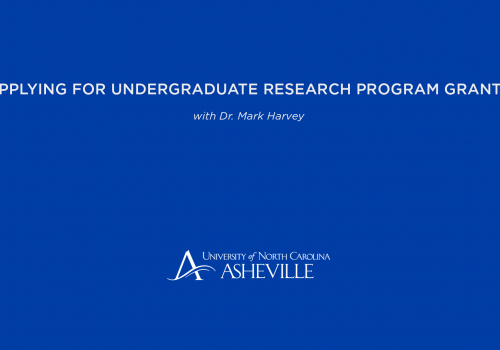All proposals should be submitted through the Research Grant Proposal Submission Form.
Watch the video
- The proper steps to complete a successful grant proposal.
- Examples of grant proposals.
- What reviewers consider in evaluating grants.
- Review along with video.
Purpose
Research and creative activity grants are intended to further the aims and objectives of undergraduate research at UNC Asheville; to increase the research and creative activity skills of our students; to provide increased opportunities for learning; to encourage professional relationships between faculty and students; and, to advance the body of knowledge in the student’s chosen field.
The Undergraduate Research and Creative Activity Program offers the following grants both in the academic year and summer session for students and faculty to apply to.
Academic Year Grants
Student Grants
Students may apply for a SAY Grant to support research or creative activity projects needing supplies/materials or travel costs related to completing the project during the relevant semester. Please use the Student Proposal Template as a guide to create your grant proposal. There is no maximum award, but the project budget must be well documented with other supporting funding sources listed. Total awards will be subject to budgetary constraints.
Faculty mentor letters of support are due a week after the submission deadline.
Faculty Grants
Faculty may apply for a FAY Grant to support research or creative activity projects needing supplies/materials during the relevant semester. Projects need not be imminent and with a specific student, but use of award money must be well described with other sources of funding and existing supplies listed in the application. Please use the Faculty Proposal Template as a guide to create your grant proposal. There is no maximum award, but total awards will be subject to budgetary constraints.
Summer Grants
Student Grants
Students will apply for project funding with a faculty mentor that includes a stipend for the student(s) and faculty, as well as supply costs. Proposals may include more than one student. If multiple students are on a project, faculty mentors will determine how much each student will receive commensurate with their time spent on the project. Student and faculty stipends must be requested, they will not be awarded automatically. Please use the Student Proposal Template.
Faculty mentor letters of support are due a week after the submission deadline.
Student Stipend(s): $3000 per student with a maximum of $6000 per project.
Faculty Mentor Stipend: $1000
Faculty Grants
Faculty may propose a project, and the project description will then be sent to all students who may apply for that project. Proposing faculty will decide which students, who apply for the project, are accepted. Projects will receive a maximum of $6000 in stipend money to be distributed at the faculty mentor’s discretion amongst the students. Projects that indicate how early career students may be included are exceptionally welcome. Student and faculty stipends must be requested, they will not be awarded automatically. Please use the Faculty Proposal Template.
Student Stipend(s): $3000 with a maximum of $6000 per project
Faculty Stipend: $1000
Supply Budget
We recognize different types of research have significantly different supply funding needs. Therefore, no predetermined limit on supplies will be provided. However, please only apply for what is needed and not covered by other funding sources; so, we can do our best to fund supplies for all awarded projects. We anticipate spending an average of $1000 to $1500 in supplies per project. Budgets detailing exactly what supplies will be used for and priced out ahead of time are more likely to be funded. Please also identify any other sources of funding, or potential sources of funding in proposals. Proposals that have higher supply needs are more likely to be funded if proposers demonstrate meaningful attempts to obtain additional funding.
Additional Information
Faculty may apply to mentor multiple projects (both student and faculty-driven), but will receive at most, only one summer stipend award. In the interest of distributing funding as much as possible, it may be necessary to limit the number of awards per faculty member.
Any currently enrolled UNC Asheville student is eligible to apply; however, preference is given to full-time students. Students who have been past recipients may reapply; however, priority will be given to first-time applicants.
Please remember the deciding committee is made up of faculty from across campus, so proposals and budgets should be written in a way that someone completely out of the field can understand the proposal, significance, objectives, and budget.
Students who receive awards are required to present at one of the UNCA Undergraduate Research Symposia (held in November and April), publish in the UNC Asheville Journal of Undergraduate Research or another publication outlet, and submit a final budget report.
Important: Receiving monetary awards to support undergraduate research travel and conference attendance may necessitate a reduction in other financial aid the student receives. Such awards may also be reported to the Internal Revenue Service in the recipient’s annual Tuition Statement (Form 1098-T). It is the responsibility of the recipient, in consultation with his/her/their tax advisor, to determine how much, if any, of the awards are taxable income to the recipient.
Research Credit and Stipends
It is the practice and view of the URP that students do NOT receive both academic credit and monetary stipend for the same work. If a student wishes to receive both academic credit and monetary compensation for work done towards a project, we ask for a written agreement between the Faculty Mentor and the student on mutually exclusive work that will count toward academic credit and payment. As such, academic year grant awards are made only for supplies to freely allow students to receive 499 or other credit for their work towards a project. Summer project grant awards may include a stipend for students, as well.
